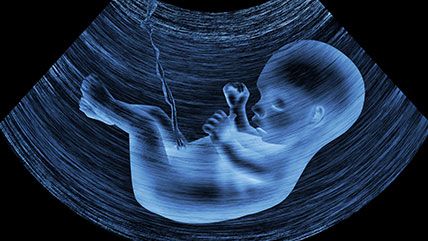Choosing Smart Embryos Isn't Immoral
It would be deeply immoral to require parents to select for particular traits, but it is also wrong to deny them the chance to make life easier for their children.

Let's say you're a fertility doctor advising would-be parents who have exactly two viable embryos ready for implantation. The parents want to implant only one embryo. This is not an uncommon scenario; more than 71,000 babies were born in the U.S. via assisted reproduction in 2016.
For several decades now, folks using in vitro fertilization (IVF) have also tested for the single genes associated with certain heritable genetic diseases (such as cystic fibrosis, Huntington's disease, or hemophilia) and chromosomal abnormalities (such as those that cause Down syndrome). Nearly three-quarters of Americans approve of this pre-implantation genetic diagnosis (PGD) testing for diseases that are fatal early in life, according to a 2015 survey in the Journal of Assisted Reproduction and Genetics, and two-thirds support it for conditions that cause lifelong disability.
But let's say that in the case of these two embryos, you have more information. Perhaps test results indicate that both embryos are physically healthy but also suggest that one of them is five times less likely to complete college than the other. Or perhaps the only discernible difference between the two embryos is a higher likelihood of coronary disease, which manifests late in life and is typically manageable with medication.
Stephen Hsu, co-founder* of the New Jersey genetic testing startup Genomic Prediction, raises hypotheticals like these and asks, "Do you tell the parents this information?"
The right answer to Hsu's question is yes, if the parents want to know.
Most common illnesses that afflict people are not the result of single gene defects but the aggregate of hundreds or thousands of different genes. By comparing whole genome sequences from large numbers of people to the diseases and traits reported in their medical records, however, researchers are now able to determine "polygenic" risk scores for such illnesses as diabetes, atrial fibrillation, inflammatory bowel disease, and breast cancer.
Based on the results of rapidly multiplying studies on these scores, genetic testing companies have begun offering to test IVF embryos for a wide variety of diseases. According to Genomic Prediction, its Expanded Pre-Implantation Genomic Testing "allows the routine, inexpensive evaluation of hundreds of thousands of genetic variants," enabling the company to generate polygenic risk scores that diagnose the risk of genetic disorders in IVF embryos.
When it comes to intelligence, for now Genomic Prediction's risk scoring can only identify genetic outliers—those embryos more likely to have either very low or very high intelligence.
What should we think about all of this? In a November New Scientist article, Lynn Murray, spokesperson for the Down syndrome support group Don't Screen Us Out, said, "If we consider inclusion and diversity to be a measure of societal progress, then IQ screening proposals are unethical." Also in New Scientist, University of Queensland geneticist Peter Visscher denounced using such tests to select embryos predicted to have high intelligence as "repugnant" but acknowledged that it is "technologically feasible."
But in 2018, the American Society for Reproductive Medicine concluded that PGD for "adult-onset conditions is ethically justified when the condition is serious and no safe, effective interventions are available." In addition, the organization accepts that "reproductive liberty arguments ethically allow" testing for adult-onset conditions of lesser severity.
Forcing parents to submit to the random vagaries of the genetic lottery puts them and their prospective children at risk of having harder lives. Higher intelligence correlates with the sorts of life achievements and satisfactions that most people want for their kids, including greater health, longevity, and economic success. Low intelligence is not a disease, but to require parents to preserve it in the age of polygenic selection solely for the sake of diversity is to force them to accept a trait that generally makes life more difficult for those who have it.
It would be deeply immoral to require parents to select for particular traits, but it is also wrong to deny them the chance to make life easier for their children.
*CORRECTION: The initial version of this article misstated Stephen Hsu's title.
This article originally appeared in print under the headline "Choosing Smart Embryos Isn't Immoral."


Show Comments (182)